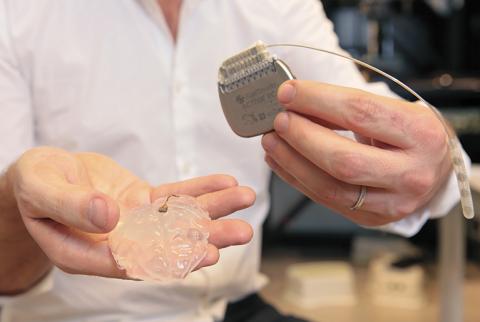Apply Now: Postdoctoral T32 Training Program in Recovery and Restoration of CNS Health and Function

The goal of this exciting new multidisciplinary, multi-institutional training program based at Massachusetts General Hospital and the School of Engineering and the Carney Institute for Brain Science at Brown University, is to enhance recovery from disabling brain injuries by filling a pressing need for clinician-scientists and neuroengineers trained to leverage the computational neurosciences and to develop and test device-based and other interventions for patients. We seek post-doctoral (MD or MD/PhD) clinician-scientists and post-doctoral (PhD) neuroengineers/computational neuroscientists to train under a multidisciplinary training faculty from anesthesia, biomedical engineering, computational neuroscience, neurology, neurosurgery, physical medicine and rehabilitation, psychiatry, and radiology.
This program is designed to meet individual objectives. Research projects must be within at least one of the following four thematic areas: 1) Clinical research and clinical trials, 2) Computational neuroscience, 3) From neural recording to neural imaging, 4) Neural repair and neuromodulation. The program’s core is a group of collaborative, multidisciplinary faculty mentors in engineering and the clinical neurosciences. We develop future academic researchers who have expertise in both engineering and clinical neuroscience, and who can communicate effectively across these domains.
PROGRAM COMPONENTS:
All Trainees
- 80% of time spent on conducting a closely-mentored, independent research project in the laboratory of trainee’s primary mentor, and learning to collaborate with others (secondary mentor) as part of a multi-disciplinary team
- Attend targeted seminars, journal clubs, visiting scholar talks, monthly lunches
- Writing & Presenting – instruction and practice
- Professional skills workshops
- Attend Grand Rounds in the clinical specialty related to trainee research when relevant topics are being presented
- Spend no more than 20% of time on clinical care
- Participate in weekly lab meetings, in tutorials with the lab director related to their research and in all other lab activities.
- Perfect proposals for K-awards or the equivalent during their 2nd year in the program
- One course per year (audit or pass/fail) in advanced engineering or clinical trials methods in area of interest. The Program Director reserves the right to waive or adjust this requirement for trainees.
APPLICATION GUIDELINES:
Two Fellowship Positions Available starting July 1, 2019:
- 1 Post-doctoral neuroengineers/computational neuroscientist (PhD fellows)
- 1 Post-doctoral clinician-scientist (MD or MD/PhD clinical fellows)
- Eligible trainees will be supported for 2 years and must be U.S. Citizens or Permanent Residents (Green Card holder).
- Please choose a T32 mentor or, if your current primary mentor is not listed as a T32 faculty member, please choose a T32 faculty member as a co-mentor prior to applying. This T32 is intended to provide a substantially new experience for its fellows. While collaboration amongst labs is encouraged, we generally expect that the primary mentor and lab will be different from the applicant’s current mentor/lab. In cases where the applicant wishes to propose continuing in their current lab, then they must make a clear case that their proposal is a departure from their current line of work
- With the help of your mentor, and possibly co-mentor, design a project that fits the objectives and components of this training program.
- Submit your current CV, a 2 page Letter of Intent (including aims, the methods for proposed project, and a plan for progression to independent funding after the project is completed), and your mentor’s and co-mentor’s NIH Biosketch to Katrina Screen, [email protected], along with the names of three referees who have agreed to be contacted as references.
- All application materials are due by 11:59 pm on January 2nd, 2019
Mentor List:
Massachusetts General Hospital
Jonathan Rosand, M.D., M.Sc. Neurology
Ross Zafonte, D.O. Physical Medicine and Rehabilitation
Merit Cudkowicz, M.D., M.Sc. Neurology/Neurology Clinical Research Institute
Sydney Cash, M.D., Ph.D. Neurology
Brian Edlow, M.D. Neurology
Lee Schwamm, M.D. Neurology
Leigh Hochberg, M.D., Ph.D. Neurology
Giorgio Bonmassar, Ph.D. Radiology/Martinos Center
Bruce Rosen, M.D., Ph.D. Radiology/Martinos Center
Emery Brown, MGH, Ph.D. Anesthesia
Joan Camprodon, M.D., Ph.D. Psychiatry
Darin Dougherty, M.D., M.M.Sc Psychiatry
Justin Brown, M.D. Neurosurgery
Ziv Williams, M.D. Neurosurgery
Joseph T. Giacino, Ph.D. Physical Medicine and Rehabilitation
Grant Iverson, Ph.D. Physical Medicine and Rehabilitation
Alik Widge, M.D., Ph.D. Psychiatry
Ana-Maria Vranceanu, Ph.D. Psychiatry
Brown University
David Sheinberg, Ph.D. Neuroscience
Leigh Hochberg, M.D., Ph.D. Engineering
Jonghwan Lee, Ph.D. Engineering
Arto Nurmikko, Ph.D. Engineering
David Borton, Ph.D. Engineering
Christopher Moore, Ph.D. Neuroscience
Wilson Truccolo, Ph.D. Neuroscience
Stephanie Jones, Ph.D. Neuroscience
Diane Hoffman-Kim, Ph.D. Molecular Pharmacology, Physiology, and Biotechnology
David Badre, Ph.D. Cognitive, Linguistic and Psychological Sciences
Michael Frank, Ph.D. Cognitive, Linguistic and Psychological Sciences
Thomas Serre, Ph.D. Cognitive, Linguistic and Psychological Sciences
Theresa Desrochers, Ph.D. Cognitive, Linguistic and Psychological Sciences



